MENU
MENU
Tea producing area: Higashiyamato City, Musashimurayama City, Ome City, Mizuho Town and Hinohara Village
Brand name of tea: Tokyo Sayama tea and Hinohara black tea
Types of tea: Sencha (medium steamed green tea), fukamushicha (deep steamed green tea), kukicha (stem tea), hojicha (roasted steamed green tea), black tea, powdered tea, etc..
Tokyo Sayama tea
Tea cultivated in the Sayama Hills and the surrounding area is called Sayama tea. The Sayama Hills extend about 11km east to west and about 4km north to south on the prefectural border between Tokyo and Saitama Prefecture.
The tea cultivated in Tokyo in the hills is called Tokyo Sayama tea.
The volume of Tokyo Sayama tea is not large, and the tea is mostly consumed locally.
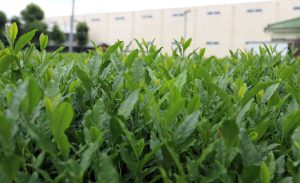
Tea fields of Moritaen in Mizuho Town (September 2019)
Sayama firing
Hire (火入れ)is firing tea leaves, the final process to refine tea leaves. Sayama hire is its own unique process. It takes time to slowly fire tea leaves at a low temperature. Because of this, Tokyo Sayama tea has a unique aroma.
Consistent system of tea cultivation, production and distribution
The characteristic of Tokyo Sayama tea is that many tea farmers use the integrated system which includes cultivation, production and sales.
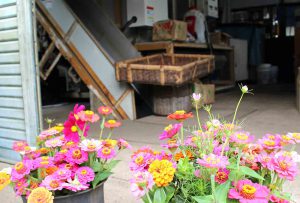
Moritaen, Mizuho Town (September 2019)
Hinohara black tea
Hinohara Village, Nishitama countryside? is rich with nature. Previously tea was cultivated and made for private use. However, due to aging and depopulation, there have not been people to cultivate and produce tea, thus abandoned tea fields have increased.
Ms. Masako Toda moved to the village to retrieve the tea fields and make black tea with villagers and volunteers.
Although she passed away in 2021, the production and sale of Hinohara black tea continues.
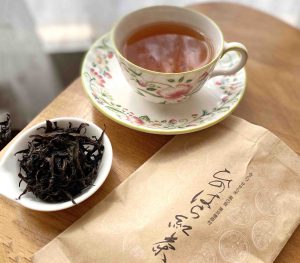
Hinohara black tea (September 2020)
Japanese tea cafe, restaurant, and hotel
In Tokyo, there are many Japanese tea cafes and restaurants where you can enjoy Japanese tea and dishes using Japanese tea. There is also a hotel with a Japanese tea culture theme. In Tokyo you can enjoy Japanese tea in a different way from tea production areas.
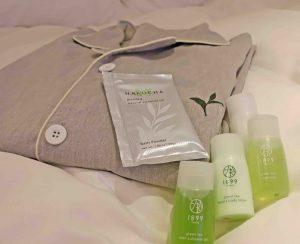
HOTEL 1899 TOKYO with a Japanese tea culture theme (June 2019)
Chanoki-jinja Shrine (茶の木神社) (Tea plant shrine)
There is a Chanoki Shrine which is worshiped as a guardian from fire in Ningyo-cho, Nihonbashi. Chanoki means a tea plant in Japanese. Tea plants were planted around the shrine, so it came to be called Chanoki-jinja.
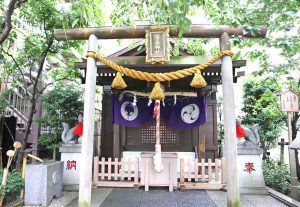
Chanoki-jinja Shrine in Ningyocho, Nihonbashi (June 2019)
Teas from around the world
There are also many restaurants with foreign cuisine, where you can savor teas from around the world, such as Tibetan batter tea, Moroccan mint tea, Myanmar’s Lepetso, etc.
Related article on the site: 「日本のお茶の生産状況」「お茶の旅 ホテル1899東京(東京都新橋)」
Tea related facilities:
Moritaen 森田園 http://morita-en.com
Chanoki-jinja Shrine 茶ノ木神社 https://nihonbashi-chanoki.wixsite.com/main
RESTAURANT 1899 OCHANOMIZU https://1899.jp/ochanomizu/
HOTEL 1899 TOKYO https://1899.jp/hotels/tokyo/ja/
Tibetan Restaurant & Cafe Tashi Delek Tibetan Restaurant & Cafe Tashi Delekhttps://tashidelek.jp
Myanmar restaurant NONG INLAY http://nong-inlay.com
Local tea mascot:
Ceramic and pottery art:
Reference:
松下智 (平成3年) 日本名茶紀行 (初版) 雄山閣出版
瑞穂町 瑞穂町の歴史、東京狭山茶
http://www.town.mizuho.tokyo.jp/town/002/p004130.html
http://www.town.mizuho.tokyo.jp/town/003/p004128.html
森田園 http://morita-en.com
檜原村観光情報Facebook
https://www.facebook.com/vill.hinohara
檜原雅子開墾団(ひのはら紅茶)
https://www.facebook.com/hinoharakaikon/
*When visiting the shops and facilities introduced in this article, please check the business hours on their website, etc. before visiting.
*The information provided on this site may be updated. If you find any information in this article that is incorrect, new, or incomplete, please contact CHAMART.
*The site does not describe all “Teas of Japan” or all “Teas of the World”. Additionally, each article expresses the writer’s personal experience and feelings.
#tokyosayamatea #yachimatatea #teatrip #greentea #tealover #enjoytea #japanesetea